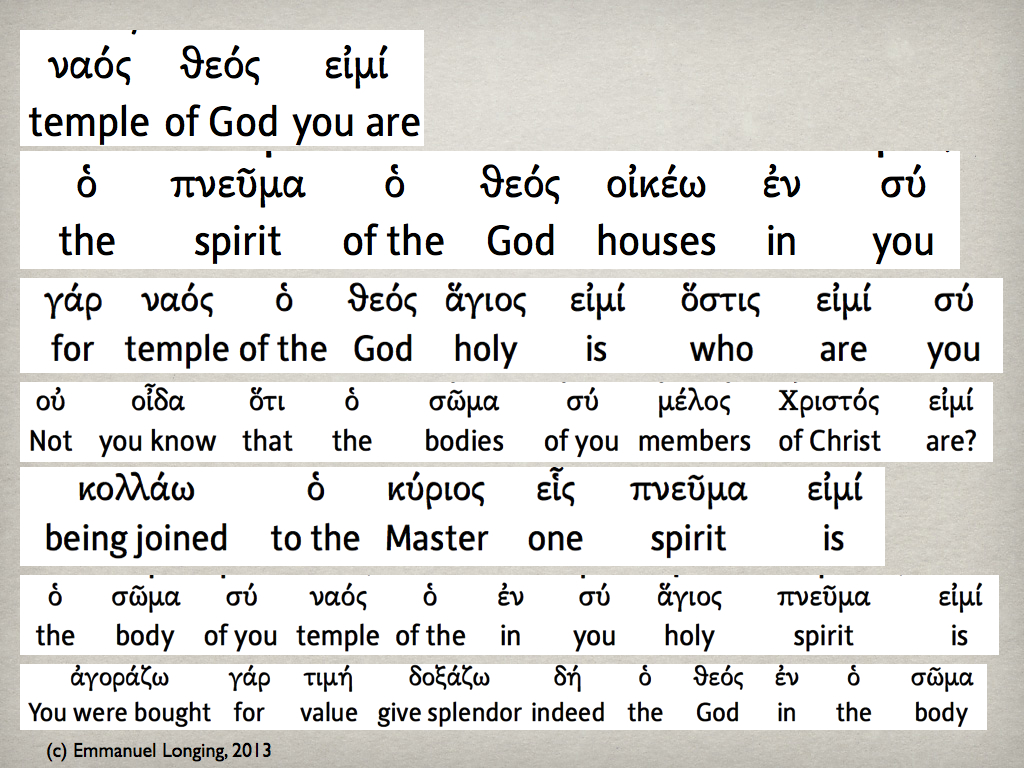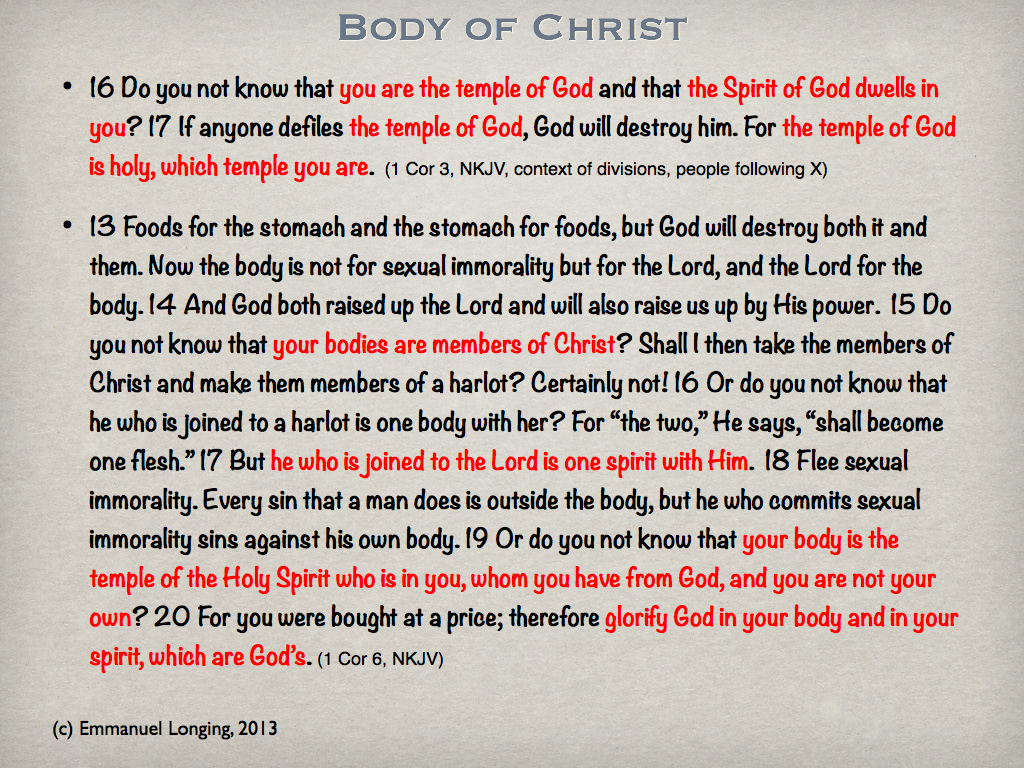Now let us join several Biblical truths together.
We’ve been identified (through a symbolic act of anointing) with the Holy Spirit. The Holy Spirit was foretold by Christ to be both our Comforter and Teacher. We also learn that Christ has a “Body” (after His ascension) made up of us otherwise meager souls. And the Spirit and Name of God continues to dwell in the naos, which naps (the Holy Place) is now in us. This is all truly astonishing.
And, further, at the risk of leading us too deeply into language issues, consider how the above seven remarkable phrases are even more powerful when expressed in their original, concise Greek language form:
There are seven phrases, all taken from the passage at the top (1 Cor 16), that we will now bore down into.
Phrase 1 (above): The naos of (the very) God you continually are. The Greek verb eimi (EYE-me) is like our simple word “be” as speaking of our essence of existence such as when we connect “be” as in “human being.” Eimi and Being are words that point to the always core of who we are. We may have the flu or a broken bone, but that is not our Eimi / Being, it is not who are. Perhaps the deepest question we can every ask someone is: “Who are you, really?” This was the central question Christ’s disciples and His enemies had of Him; even Pilate in the final moments before the Cross asked that very question of Jesus.
Phrase 2 (above): The Spirit (i.e., the Holy Spirit) of The God make His home (pi-kay-oh) in you (su). The idea of one’s home (one’s oi-kay-oh) was a deeper issue in the language of Greek, in somewhat a parallel way to “home” in English compared to an alternative word of “house.” As the song goes, “a house is not a home….” A home is place of belonging, our belonging, and, we hope, the belonging of those we love and who love us. Well, even if you are living in ‘a house,’ if you are in Christ, then you are ‘at home’ with the very Spirit of God, and you will always be. When that ‘house’ of your body finally expires, the real you, the Eimi / Being you, will not cease to Be, even for an instant.
Phrase 3 (above): This is even clearer, and more astonishing, if that is possible. The phrase opens with “gar” (meaning “for,” i.e. giving an explanation for the promises in this Chapter 6 of 1st Corinthian Epistle), then simply states a obvious eternal truth, that the naos of God is holy (“agios,” meaning uniquely set apart), with the “is” being again that “to be” verb “Eimi” (meaning the always Being One who is identified with the naos is of God and always always set apart). Nothing shocking or unexpected in the first half of Phrase 3, although it is easy for us to set aside the absolute Holiness and Uniqueness and Highest Value of God as not something very important in our day to day worries and desires. The last half of this Phrase 3 is shocking: three simple words–“who you are!” (Where the “are” is again our Being word “Eimi“). So just think of it, in this letter to the Corinthian fellowship of called out Believers, God through His very Word is affirming something undeserved and unimagineable as being eternally true. What is especially shocking about this statement is that, although it applies to all of Christ’s Redeemed, including even you and me, it was recorded for us in a letter to the most carnal and raucous of the local fellowships in the New Testament, those pretty wild Corinthians. (In those times to refer to a female as a “Corinthian Girl” was an insult with evil moral connotations, because of the reputation of that city). These were what we might call very fleshy / carnal people (pretty much like us today in the West). And the Holy Spirit through the pen of Paul is telling them that there is something essential about their new Being in Christ that they are not fully realizing.
Phrase 4 (above): This phrase asks a question, which is a powerful way of getting into one’s head deeply considering the matter in order to be ready for an answer. We’ve all that experience of being asked something that leads to us thinking or re-thinking something. Here the truly deep thought is that our “soma” (which another way of referencing our Being in the sense of our body represents our identity, as it both contains us and is the outworking of us in the world), if a member of Christ Himself, and this is our always Eimi (being).
Phrase 5 (above): This adds a new dimension to our Being as having the naos of the Spirit of God, namely that by this we are One with the Spirit of the Lord (recall that “Kurios” is the Greek word for Lord, which translates the Hebrew Tetragrammaton YHYW). We have been made into “one” entity wit the very Lord. When God ‘sees’ Jesus, within that unity of Being of God, God ‘sees’ us. That’s incredible. And it is only possible because every debt that we owed, from our birth in sin in Adam to the plethora of sins we added to our Being, energized by that spirit of rebellion and independence, has all been fully and finally redeemed (paid for).
Phrase 6 (above): Here we have again a reference to our Being by the connection to our “soma” (Being-Body) which is the naos of the Holy Spirit, with again the Eimi (always Being idea).
Phrase 7 (above): Finally, we are told that we were purchased for a price (value). That Greek word “purchased” has as its root the “ah-gor-AH,” which was the central marketplace in Greek cities. You could buy everything there, even slaves. It is clear from this and other passages in Scripture, that you and I were slaves, meaning that we were not free, nor internally ‘free-able;” slaves cannot, absolutely cannot, redeem themselves because everything they had or ever will have already belongs to their owner. They in a pit from which there is no independent escape. God’s Word says that was your and my condition prior to, the amazing act by which we were bought for something of great value (tee-MAY, the Greek word for “honor,” or high importance). Therefore it is clear that we should give splendor within out Being (“soma“) to the God who made such Redemption.
Let us now turn to the consideration of the Work of Christ in this present age.
